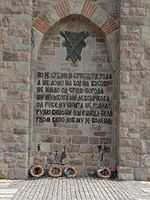Gazimestan
Coordinates: 42°41′26″N 21°07′25″E / 42.69056°N 21.12361°E

Gazimestan (Serbian: Газиместан, Serbian pronunciation: [ɡaziměstaːn]) is the name of a monument commemorating the historical Battle of Kosovo, situated about 6-7 kilometres north-northeast of the actual battlefield, known as Kosovo Field (Serbian: "Косово Поље", "Kosovo Polje"), or in Albanian: "Fushë Kosovë/Fushë Kosova". The monument was designed by Aleksandar Deroko and built in 1953 under the authority of the Federal People's Republic of Yugoslavia. It is in the shape of a medieval tower. Gazimestan is reached from the Pristina-Kosovska Mitrovica highway, on a 50 m hill above the plain, ca. 5 km north-west from Pristina.
Etymology
The name originates from the Ottoman Turkish word "gazi", meaning 'hero' (or in specific contexts 'war veteran'), which in turn is a loanword from Arabic. Thus, in a portmanteau with the Serbian word "mesto", meaning place, Gazimestan's meaning becomes "Place of Heroes".
History
The monument was the location of the Gazimestan speech delivered by Slobodan Milošević on the 600th anniversary of that battle in 1989, which preceded a violent surge in nationalistic and ethnic tensions prior to the Breakup of Yugoslavia.
Inscribed on the monument is the "Kosovo curse" attributed to Prince Lazar:
- "Whoever is a Serb and of Serb birth
- And of Serb blood and heritage
- And comes not to the Battle of Kosovo,
- May he never have the progeny his heart desires!
- Neither son nor daughter
- May nothing grow that his hand sows!
- Neither dark wine nor white wheat
- And let him be cursed from all ages to all ages!"
This form of the curse first appeared in the 1845 edition of the collection of Serbian folk songs by Vuk Karadžić.
See also
-
Gazimestan monument on Vidovdan 2009, with Knez Lazar.
-

Kosovo Field, with disposition of Serbian and Ottoman troops before the Battle of Kosovo.
-

Gazimestan monument
-
Serbian boys remembers the victims of the battle of Kosovo.
Notes and references
Notes:
| a. | ^ Kosovo is the subject of a territorial dispute between the Republic of Serbia and the Republic of Kosovo. The latter declared independence on 17 February 2008, but Serbia continues to claim it as part of its own sovereign territory. Kosovo's independence has been recognised by 107 out of 193 United Nations member states. |
References:
External links
- http://www.yuheritage.com/pristina1.htm
- http://www.kosovo.net/news/archive/2006/October_03/5.html
- http://news.bbc.co.uk/2/hi/europe/8574983.stm
| ||||||||||||||||
| Wikimedia Commons has media related to Gazimestan. |



